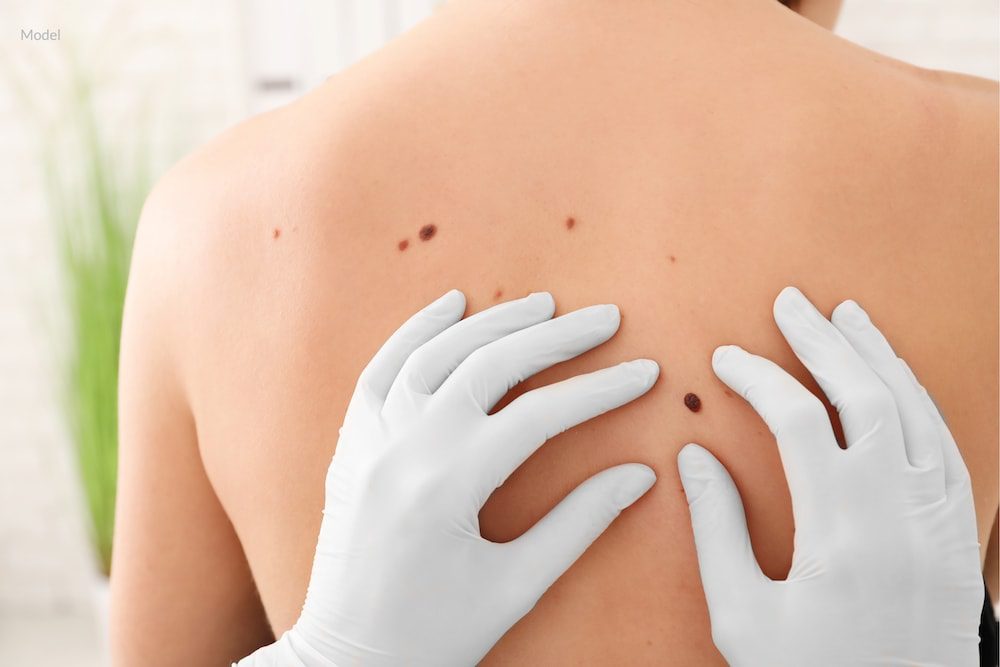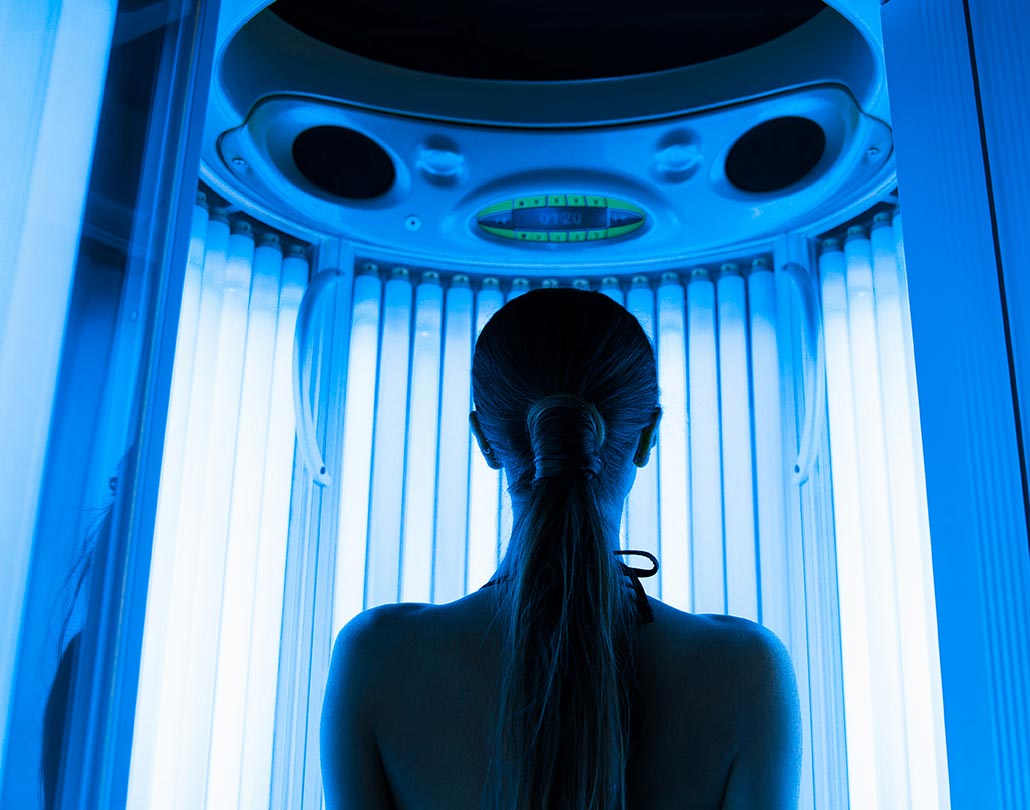Mohs Surgery, Skin Cancer | The Office of Dr. Vincent Hung

Ultraviolet (UV) rays from the sun are the biggest and most well-known cause of skin cancer. However, other factors at play affect the health of our skin. This blog discusses how skin tone, moles, lifestyle choices, and other factors can impact your risk of developing skin cancer.
9 Minute Read:
What Is Skin Cancer?
Skin cancer is the most common type of cancer in the United States. According to the American Academy of Dermatology, at least three million people are being affected by non-melanoma types of skin cancer every year. It occurs when abnormal cells in the epidermis (outermost layer of the skin) grow uncontrollably due to unrepaired DNA damage, leading to mutations.
What Are the Different Types of Skin Cancer?
The three most common types of skin cancer include the following:
- Basal Cell Carcinoma (BCC): uncontrolled growth of abnormal cells from the basal cells in the epidermis (outermost layer of skin) that typically develops on areas of the skin exposed to the sun
- Squamous cell carcinoma (SCC): uncontrolled growth of abnormal cells from the squamous cells in the epidermis (outermost layer of skin) that typically develops on areas of the skin exposed to the sun
- Melanoma: the most dangerous type of skin cancer that occurs when melanocytes (pigment-producing cells) in the skin become cancerous.
Can Skin Picking Cause Cancer?
Although frequent picking or scratching of the skin can cause damage to the skin, researchers have not discovered a causative link between this unhealthy habit and skin cancer.
Is Skin Cancer Only Caused By the Sun?
We are constantly warned that sun exposure causes skin cancer, and it is true that ultraviolet (UV) light from the sun is responsible for more skin cancer cases than anything else. However, the sun is not the only threat to the health of your skin.
What Is the Most Common Form of Skin Cancer Which Is Not Related to Sun Exposure?
Melanoma is a common form of skin cancer that can appear in locations of the body areas with little to no exposure to the sun or UV rays.
Can You Get Melanoma Without Sun Exposure?
Yes, melanoma can develop anywhere on the body, even in locations not heavily exposed to the sun, such as the bottom of the hands and feet, inside the mouth, and even under the nails.
Common Risk Factors and Possible Causes of Skin Cancer Other Than the Sun and UV Rays
Skin cancer has many causes and types, including the risk factors discussed below. It’s essential to educate yourself about skin cancer to protect your health and the health of your loved ones. Below are four common risk factors and possible causes of skin cancer besides the sun and UV rays.
1. Skin Tone
Skin cancer can affect people regardless of skin tone; however, those with less pigment (melanin) in their skin are at a higher risk of developing skin cancer. It is estimated that Caucasian men over 50 have the highest risk of getting melanoma due to a reduced amount of pigment in the skin.
How Is Skin Tone Related to Sunburn?
We know to proceed with caution when basking in the sun’s rays, but the risk doesn’t end when our day in the sun is over. Many misconceptions exist about the relationship between sunburn, skin tone, and skin cancer.
Sunburn is an inflammatory skin reaction that occurs after prolonged exposure to sunlight. Anyone can get a sunburn, but those with fairer skin and freckles are more prone to them.
It’s important to note that while darker skin tones are less likely to get sunburn, it is still a possibility–and it’s less visible on darker skin. Additionally, skin cancer is often noticed in its more advanced stages in darker skin, when it’s much more difficult to treat. If you have darker skin, be sure to monitor your skin regularly and report any changes to your doctor immediately.
Does Sunburn Cause Skin Cancer?
Sunburn damages the skin, and cell damage can contribute to the development of cancer. Although one sunburn doesn’t immediately spell skin cancer, even one instance of sunburn can increase your risk of developing skin cancer.
Prevention is key. Limit your time in the sun and protect your skin whenever you’re outdoors. Wearing clothing and hats with an ultraviolet protection factor (UPF) of 30 or higher is one of the best ways to protect your skin from the sun. In addition, apply a broad-spectrum sunscreen with a sun protective factor (SPF) of 15 or higher to exposed skin—regardless of season (summer, winter), weather (hot, cold), or sky conditions (sunny, cloudy).
Does Sunscreen Cause Skin Cancer?
Some people have concerns about chemicals in sunscreen. Remember, chemicals are just molecules and aren’t inherently good or bad. Currently, there is no scientific evidence that sunscreen can cause skin cancer. If anything, it’s the inactive ingredients in sunscreen, such as fragrances and preservatives, that can cause sensitivity or an allergic reaction. It’s a good idea to test for sensitivity to new products on an inconspicuous area of the body before use.
People who use any type of sunscreen can still develop skin cancer, often because of sun exposure earlier in life. Using sunscreen can reduce the risk of melanomas and carcinomas by almost half. Find a sunscreen that works for you, and apply it 15–30 minutes before going outside.

2. Tanning Beds
Indoor tanning beds are often promoted as a safer and faster alternative to long hours laying out in the sun. This is not true. Indoor tanning devices increase the risk of developing BCC by 24% and SCC by 58%. In addition, studies have shown a causative link between indoor tanning and melanoma in younger women and men. Using indoor tanning devices before age 20 can increase the risk of developing melanoma by 47%, and that risk continues to increase with each use.
The UV radiation exposure caused by tanning beds is completely avoidable. For the sake of your health, consider embracing your natural skin tone or use a DHA-based spray tan to achieve a safer glow.
Can Infrared Light Cause Skin Cancer?
Different kinds of light waves, including UV, visible, and infrared light, can all impact your skin. On their own, visible and infrared light don’t cause sunburn or skin cancer. In combination, however, all three forms of light waves can penetrate the deeper layers of skin and contribute to cell damage.
3. Moles
In most cases, moles are harmless and will not develop into cancer. However, the more moles you have, the higher your risk of developing cancer.
Many cells in a mole contain cancer-related genes that cause them to grow and multiply. These genes are often dormant, but this may not always be the case.
Can a Mole Become Cancerous Without Sun Exposure?
Although rare, other factors, such as viruses, chemical exposure, and other environmental pollutants, may contribute to the development of melanomas. More research is required to validate these claims, but they serve as a reminder to be mindful of your environment and maintain health checkups.
If you have multiple moles, it’s wise to keep regular appointments with a dermatologist for thorough skin exams.
4. Smoking
Usually, when we think of smoking, we relate it to cancers of the lungs, mouth, or throat. You may be surprised to know that smoking can also have a significant effect on the development of skin cancer.
Smoking can increase the risk of squamous cell carcinoma, especially on the lips. It’s possible that smoking also decreases immune function, which can contribute to an increased risk of cancer.
Smoking has also been linked to cancer metastasizing or spreading—possibly because of the harmful effects that the accompanying chemicals have on DNA. Your best bet is to avoid smoking altogether.
How Can You Help Prevent Skin Cancer?
As the old saying goes, “An ounce of prevention is worth a pound of cure.” Below are a few tips on how you can lower your risk of developing skin cancer.
Stay Out of the Sun
One of the simplest ways to protect yourself from skin cancer is to limit your exposure to the sun’s UVA and UVB rays. Staying out of the sun is not always possible, so wear a broad-spectrum sunscreen with an SPF of 15 or higher daily. Wearing UPF clothing and hats will also help protect your skin from the sun’s harmful rays.
Avoid Tanning Beds
Studies have shown that UV radiation from tanning beds damages the skin’s DNA cells, which can lead to premature aging of the skin and increase the risk of developing skin cancer. The American Academy of Dermatology (AAD) advises people to avoid using tanning beds.
Maintain Good Health
Living a healthy lifestyle is essential to maintain good health. Don’t smoke, avoid unnecessary harsh chemicals, and limit alcohol, sugar, and fast food. Staying active can boost the immune system and reduce inflammation, and eating a diet rich in nutrients helps your body fight chronic illness. These actions cannot prevent cancer, but together, they can decrease your risk of developing cancer and other chronic diseases.
Self-Checks and Doctor Exams
Routine checkups and self-awareness also play a significant role in prevention and detection. Look for warning signs of skin cancer, such as changes in size, shape, or color of a mole, the appearance of a new growth, or a sore that will not heal.
When performing a self-examination of your skin and any moles or lesions, follow the ABCDE rule:
- Asymmetry: one half of the lesion or mole does not look like the other half
- Border: the lesion or mole has an irregular border
- Color: the color of the lesion or mole is not uniform or has changed (usually darker)
- Diameter: the diameter of the lesion or mole is larger than 6 mm (the size of a pencil eraser)
- Evolving: the lesion or mole has changed in size, shape, or color
If you notice any of the above, be sure to visit a board-certified dermatologist to determine if cancer has developed. If cancer is found, it can often be treated with Mohs surgery. Mohs surgery is a specialized procedure that removes layers of cancerous skin in stages to prevent the unnecessary removal of healthy tissue. In some cases, skin grafts are used to restore the appearance of the skin.
Once a diagnosis has been obtained by a practicing dermatologist, request a referral to Dr. Vincent C. Hung. Dr. Hung is triple-board-certified in dermatology, Mohs skin cancer surgery, and plastic surgery – assuring you the most aesthetically pleasing results following Mohs surgery.
Want to Learn More About Skin Cancer?
If you or someone you love needs more information about skin cancer treatment, please contact Dr. Hung at his Pasadena office at 626-432-5032 or his Newport Beach office at 949-574-8292.
